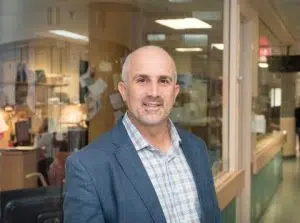According to the Liver Foundation of Canada, one in ten Canadians, or more than three million people has some form of liver disease. That statistic alone goes to show that liver disease is a growing concern in the country.
Dr. Paul Marotta specifies in liver transplants at LHSC University Hospital. He explains the biggest contributor to liver disease and failure.
“The biggest problem with liver disease right now and the growing problem which affects a lot of population young and old, is the epidemic of obesity.”
Obesity has a track record of leading to other diseases. Marotta says obesity usually leads to a disease in the liver called fatty liver.
“With this metabolic syndrome called obesity, you’re at risk of diabetes, high cholesterol, all of those things negatively impact the liver function and you get this fatty liver condition.”
Alcohol is also a major contributor to liver disease and failure. Marotta describes the amount of alcohol consumption that the liver can handle, before it leads to liver disease.
“We generally recommend everything in moderation. Two to three drinks per day is the max which gives you twenty drinks a week, that would be a safe amount.”
Battling liver disease
Three years ago, Londoner Jillian Best, battled liver disease and underwent a liver transplant. The disease was unavoidable from being passed down in the family.
“There’s a hereditary disease called hereditary hemorrhagic telangiectasia. My grandma suffered from it and it affected her lungs, my mom had it as well in her liver as did I.”
The transplant was difficult for her and her family, but Best knew she had a good support system to help her through everything.
“The transplant itself was very difficult not just for me but on my family who watched me go through it losing my health, losing my muscle mass, gaining a lot of fluid on my abdomen. I knew though, that I had a great family who was going to help me through it.”
The transplant took a toll on Best mentally and physically, but she’s a strong believer in transplants and is grateful for it every day.
“I just came back from a holiday and I celebrated my three year anniversary since having my transplant and I just felt like I was in awe the whole time I was away. I’m just so grateful I was able to experience being in another part of the world. I’m thankful every day for every day that I have now to live. Without my liver transplant, I wouldn’t be here.”
Support in the city
New technology has allowed liver treatment to be performed outside of London hospital settings. Liver Cares Canada offers in-centre and mobile support for those battling liver diseases.
“There’s a lot of conditions that have always been thought to be needed to be treated in hospital, that can now be stabilized in an outpatient setting. We are trying to create the outpatient setting outside of hospitals that serve the need of certain liver diseases,” said Karim Ragheb, CEO of Liver Cares Canada.
Ragheb and the organization are working to treat six diseases outside of the hospital setting.
“We’re treating hepatitis B, hepatitis C, some forms of liver cancer, hepatic encephalopathy, primary biliary cholangitis, and fatty liver.”
Since they opened in 2015, more than 6000 patients have been treated for their liver condition and cured over 1000 patients with Hepatitis C.





